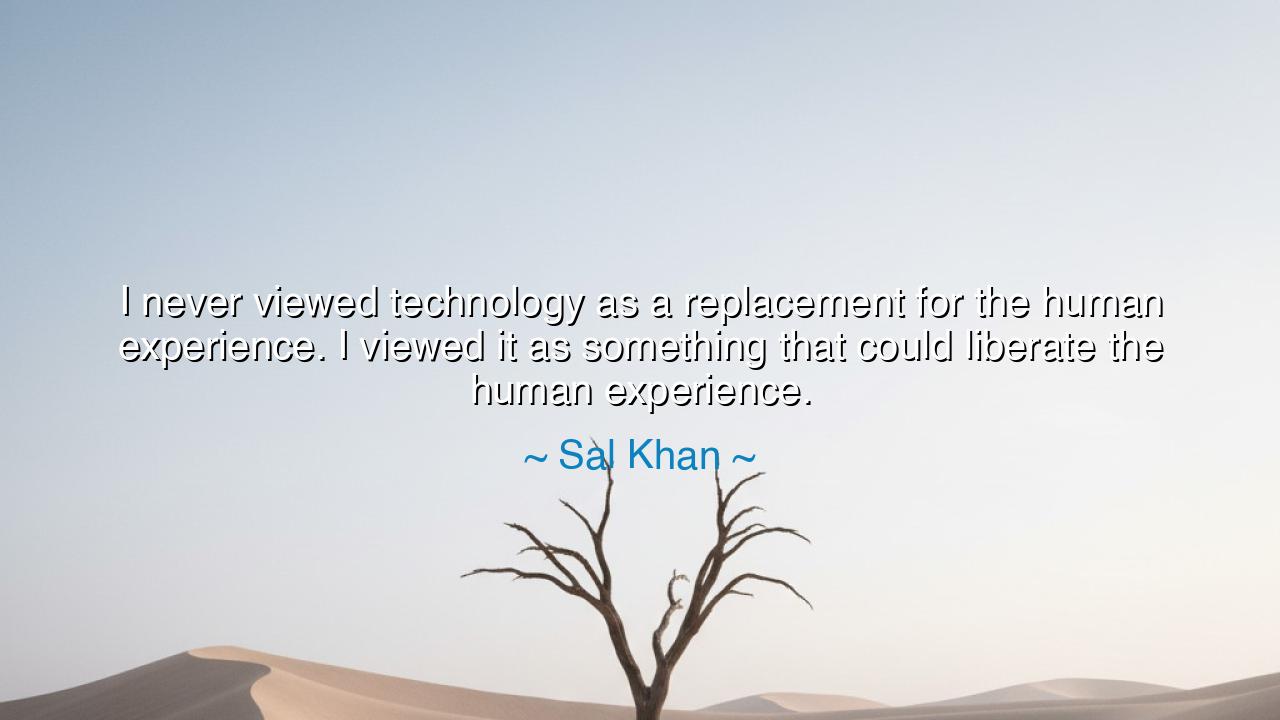
I never viewed technology as a replacement for the human
I never viewed technology as a replacement for the human experience. I viewed it as something that could liberate the human experience.






Sal Khan, the teacher of millions and founder of a new way of learning, speaks with a voice both humble and profound when he declares: “I never viewed technology as a replacement for the human experience. I viewed it as something that could liberate the human experience.” In these words lies a truth as old as invention itself: that tools are not meant to diminish us, but to set us free. His vision is not of machines that make us less human, but of technology that lifts the burdens of toil, ignorance, and limitation, so that the soul may rise to its fullest height.
From the beginning of history, mankind has wrestled with the question of tools. The plow, the wheel, the printing press, the telegraph—each invention stirred fear as well as hope. Some trembled that such things would weaken memory, ruin tradition, or replace the sacred rhythms of life. Yet, when guided with wisdom, these instruments became liberation: the plow freed man from hunger, the press freed wisdom from the prisons of parchment, the telegraph freed voices from the tyranny of distance. Khan walks in this same tradition, reminding us that the measure of any tool is not in whether it replaces, but in whether it enlarges.
The human experience, he says, must never be cast aside. It is the warmth of friendship, the challenge of learning, the joy of discovery, the pain and triumph of growth. No machine can replicate the heart that beats within these things. But machines—if wielded wisely—can remove the chains that hold us back. A child without access to teachers can now, through a simple screen, hear lessons that would once have been locked away. A learner who struggles in silence can find encouragement in voices carried by wires and waves. Technology here does not replace the teacher; it multiplies the teacher’s reach. It does not diminish humanity; it magnifies its possibility.
Consider the story of Johannes Gutenberg. When his press began to pour forth books, some feared that it would destroy memory and cheapen sacred texts. Yet the opposite proved true: it liberated the human mind, bringing knowledge to the poor, to the distant, to the eager who would never have touched a manuscript. The press did not replace wisdom; it spread wisdom like fire across the earth. In the same way, Khan’s vision of technology is not as an end in itself, but as a bridge, carrying the riches of learning to every soul that longs for it.
Yet let us not forget the danger he warns against. For when men make idols of their inventions, when they treat technology as a substitute for touch, for community, for love, then the soul begins to wither. The ancients knew this well: that a sword can defend the innocent or destroy the innocent; the tool itself is neutral, but the spirit that wields it gives it meaning. Technology that seeks to replace the human experience becomes a chain. Technology that seeks to free it becomes a key.
The lesson for us, then, is to wield our tools with intention. Do not allow screens to replace voices, or machines to replace compassion. Let them instead clear the way, shorten the path, open the door. Use them to reduce drudgery, so that more time may be spent on love, on wisdom, on creativity. In education, in work, in life, remember that tools are servants, never masters. It is the human spirit that gives them purpose, and the human heart that gives them meaning.
Therefore, O seekers of wisdom, carry this teaching with you: technology must liberate, not replace. Let it expand your reach, but never let it consume your essence. Let it teach you swiftly, but never let it rob you of the joy of discovery. Let it connect you across oceans, but never let it sever you from the warmth of those beside you. For if we remember this balance, then technology will not chain us in coldness, but will instead unbind us, so that the human experience may rise brighter, freer, and more profound than ever before.






AAdministratorAdministrator
Welcome, honored guests. Please leave a comment, we will respond soon